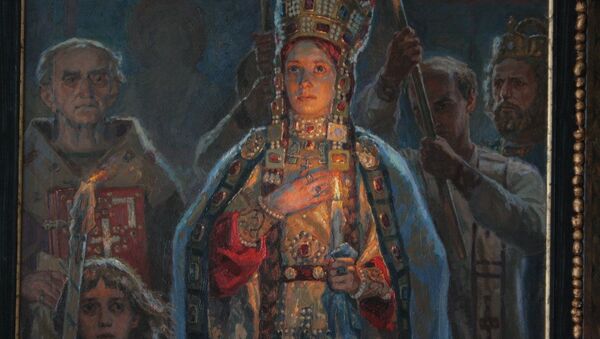During his visit to Paris, Putin touched on the 1,000 years of history between Russia and France. "This is reflected in the exhibition we are about to visit, an exhibition marking the 300th anniversary of the visit to France by tsar and reformer Peter I.
"The ties between Russia and France did not begin with this visit however, but go back much deeper in time. The educated French public is familiar with Anna [Yaroslavna] of Rus, Queen of France," Putin said.
Putin's claim that Anna Yaroslavna was a Russian princess, and his referring to her as "Anna of Rus," could only bother two kinds of people: really finicky history nerds and Ukrainians.
When @Russia says Anne de Kiev established Russia-France relations, let us remind the sequence of events pic.twitter.com/nBKhQdyKql
— Ukraine / Україна (@Ukraine) May 30, 2017
Both Russia and Ukraine (as well as Belarus, which stayed out of this particular sibling squabble) trace their cultural lineage back to Kievan Rus, a federation of Slavic tribes in the early Middle Ages. Anna Yaroslavna, also known as Anne of Kiev and Anna of Rus, was the daughter of the Grand Prince of Kiev, Yaroslav the Wise.
@Ukraine @Russia Don't be jealous, @Ukraine. In 1051 Kiev was capital of the united #Rus which included territories of modern 🇧🇾, 🇺🇦 and 🇷🇺. pic.twitter.com/TMX5KiGAPl
— MFA Russia 🇷🇺 (@mfa_russia) May 30, 2017
Anna married Henry I, King of the Franks, making her one of the first Eastern Europeans to be involved in a Western European dynasty. When Henry died in 1060, Anna became the Queen Regent. This made her the de facto ruler of France for five years, until her enemies in court ousted her from power in favor of her 13-year-old son Philip I.
@mfa_russia @Russia @diplohistory Kyivan Rus stretched to modern-day areas of 🇪🇪 🇱🇹 🇱🇻 🇵🇱 🇸🇰 🇲🇩 too. Don’t give the “triune nation” nonsense pls and comply with int law pic.twitter.com/DVO9NToZiP
— Ukraine / Україна (@Ukraine) May 30, 2017
Since the Kievan Rus is as much the progenitor of Ukraine as it is Russia (and vice versa), it would be fair to call Anna Yaroslavna both Russian and Ukrainian. Perhaps in happier times, it could be left at that.
@Ukraine We are proud of our common history. 🇷🇺, 🇺🇦 & 🇧🇾 share the same historical heritage which should unite our nations, not divide us. pic.twitter.com/hdmkuGy22p
— РоссиЯ 🇷🇺 (@Russia) May 30, 2017
Ukraine's official twitter account also made reference to the "triune nation" ideology, also known as the All-Russian nation ideology. A notion adopted by the tsars of the Russian Empire that still survives today, it considers Russia, Ukraine and Belarus to be three branches of the same people. Putin has expressed his affection for this idea, while anti-Russian partisans in Ukraine label it a Russian attempt to exert control over its neighbors.
@Russia You really don't change, do you? pic.twitter.com/HDfS9A8jWZ
— Ukraine / Україна (@Ukraine) May 30, 2017
Fortunately, this hostile exchange between the two nations involved no actual shots fired. To paraphrase Albert Einstein, "I do not know what weapons World War III will be fought with, but World War IV will be fought with passive-aggression and Simpsons GIFS."
@Ukraine @Russia BEEF! pic.twitter.com/JQgSPm1R00
— Sipho Hlongwane (@comradesipho) May 30, 2017
— ʕ•ᴥ•ʔ✨ (@Rokashi) May 30, 2017
— Dana Regev (@Dana_Regev) May 30, 2017


